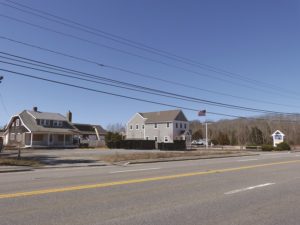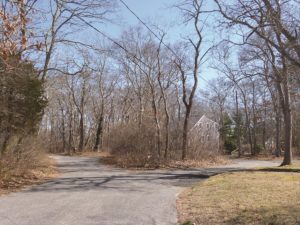EASTHAM — Two projects have been proposed for the Transition Commercial District, designed for small-scale commercial and residential development on Route 6 outside the Core Commercial Area. But neighbors have raised objections to allowing access via nearby Wiley Lane.
CEO Tim Klink of Coastal Companies wants to develop two properties south of his 4665 Route 6 office. First, he would demolish two dilapidated buildings immediately to the south and build a mixed-use retail and residential building with four one-bedroom apartments on the second floor and a possible coffee shop on the first.

South of that, on a heavily wooded lot at 4615 Route 6, Klink wants to build 16 townhouse units in eight buildings. The one- and two-bedroom units would be condominiums, priced from the high $300,000s to high $400,000s.
The developer is proposing that the homes be accessed from Route 6 southbound via a single curb cut shared with his 4655 property. To limit left-hand turns in or out by northbound traffic, the development would open at its southwest corner into a cul-de-sac at the end of Wiley Lane, which feeds into Massasoit Road.
“We have rights to develop Wiley Lane all the way out to Route 6 … but it’s not in the best interests of the neighbors or of the town,” Klink said by telephone at a planning board hearing on March 18. Still, he said, “people living in this development should have the right to come and go with an access not on Route 6.”
Also on the telephone for the remote meeting were representatives of 8 of the 12 households on Wiley Lane. All were opposed to use of the cul-de-sac.
“I think housing is important, but to open up Wiley Lane for traffic, to a shortcut away from Route 6, would be an inconvenience for any of us living here,” Evelyn Mullen said.
Debbie Canyock, who said her house is “right next to the property to be developed,” protested the introduction of “a significant amount of traffic, more than double what we have. It’s a quiet residential street. Most people bought their property for that reason. We have a daughter in a wheelchair we like to bring on street walks.”
“The development in and of itself seems appropriate and appealing for the area,” said Mike McCarthy, but access through Wiley Lane “will change the character of the neighborhood drastically.”

Jane Whitney said she wouldn’t have bought her corner lot on Wiley and Massasoit if Wiley were not a cul-de-sac. “In the summer, Massasoit is backed up all the way to Route 6 by the Wellfleet movie theater,” she said. “There’s not a possibility this driveway will not be used as a cut-through.”
Klink said alternatives had been explored, but it’s important “that people in the neighborhood have a safe way to get to Massasoit Road without going to Route 6.”
Stephen Woodard said he couldn’t imagine why “anybody on the board would think this is a good idea. We started out with a representation that it would be senior housing [via age restrictions that were later dropped]. Then it’s not 100-percent owner-occupied; [they] encourage summer rentals.”
Before hearing from the public, planning board members had praised the project and questioned some elements of it. Noting attractions such as Ben & Jerry’s and Dunkin Donuts down the street, Board Member Jim Kivlehan suggested “extending the sidewalk down to the traffic light” for pedestrians. Klink said he would consider a sidewalk connection to the proposed coffee shop.
Vice Chair Lauren Barker said the development “accomplishes what we’re looking for overall: infill of empty spaces. The landscaping and architecture are really top-notch.” She approved the absence of age restrictions. “With our housing needs, there are single people of all ages,” she said. “These would be perfect for working people on the Outer Cape.”
Asked by Barker how he would “prevent use of these as summer rentals,” Klink countered, “We would encourage it…. Some rentals are critical to our economic environment.”
Chair Art Autorino asked Klink to “seriously consider” testimony regarding this “through way on Wiley Lane. If you eliminated that, most of the abutter dissent would go away.”
“We’ll take a look at it,” Klink said. Both projects were continued to the board’s April 15 meeting.



